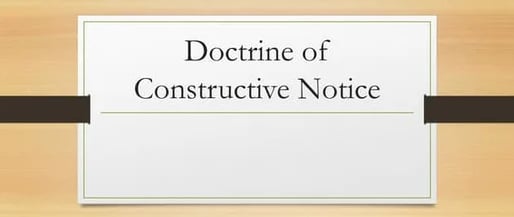Constructive notice in law: An overview and a collection of legal allusion.
A constructive notice may essentially be defined as a legal assumption that one party is aware of a fact until the time he or she is not aware of it, and if inquiry had been made, such fact would have been fathomed. In layman's terms, if any such information is available to the world or any such knowledge would have been discovered by a person through the exercise of reasonable care, the law presumes that knowledge to have been part of that person's awareness.
Niroopama, 3rd year BA LLB Hons. at Lovely Professional University
4/22/20253 min read


This is in contrast to actual notice, which consists of the communication of direct information or knowledge of the fact to the person. Constructive notice is therefore a form of protection against an assumption of ignorance when, through some reasonable investigation or common business practice, the information should have been ascertained.
Legal definition of constructive notice:
According to the provisions of Section 3 of the Transfer of Property Act, 1882 (India), "notice" used in that section refers both to actual notice and constructive notice. The explanation to this very section goes as follows:
"A person is said to have notice of a fact when he actually knows that fact or when, but for willful abstention from an inquiry or search which he ought to have made, or gross negligence, he would have known it."
The import of that definition goes to Constructive Notice-it may be said that a person cannot shut his eyes to facts he ought to have been aware of by the exercise of ordinary prudence.
In Property Law: Constructive Notice construction.
Constructive notice plays a crucial role in immovable property transactions. All concerned parties are bound to carry out reasonable due diligence to determine the state of affairs before they enter into a purchase, lease, or mortgage of immovable property. Some of these due diligence procedures are:
• Physical inspection of the property.
• Examination of the title deeds.
• Search of the land records.
• Consultation with neighbors or occupants.
• Reviewing registration and encumbrance details.
Types of Constructive Notice:
1. Notice by Registration of Documents
Property transaction documents are generally registered under the Registration Act of 1908.
On registration such documents become public records; it means that if any person is dealing with such property, he is deemed to have constructive notice of the contents of its last instrument even on the premise that he had not actually examined it.
2. Notice on Possession
Possession of property by a person who is not the original owner, usually sufficient to alert an intelligent buyer.
Investigation has to be done as to how the title possesses;- otherwise, this may grant constructive notice of rights to the occupier in possession.
3. Notice by Chain of Title Documents
The previous documents or deeds in the chain of title contain some limitations, easements, or interests of third parties and a buyer does not take notice to check it, the law shall assume that he had notice.
4. Notice by Willful Abstention or Negligence
The law imputes constructive notice if a person intentionally avoids inquiry or shows gross negligence in investigating important facts.
Case Laws on Constructive Notice:
1. Rame Gowda v. M. Varadappa Naidu (2004) 1 SCC 769
Facts: The title in favour of the person in actual possession of the property in question had not been registered, but his possession was kept open and continuous.
Held: The Supreme Court held that possession gives notice of the possessor's title. A purchaser ought to have inquired as to the nature of such possession; ignorance would amount to constructive notice.
The Court held that registration of a document gives constructive notice to all persons dealing with the property.
2. Ahmedabad Municipal Corporation v. Haji Abdul Gafur (1971)
The constructive notice will stand where a party deliberately chooses to ignore clear information that could have been ascertainable by a reasonable inquiry.
Exceptions of constructive notice:
Generally speaking, constructive notice is binding against all; still, courts can excuse parties under special and exceptional circumstances:
• When the information would not have been reasonably ascertained, even with due diligence;
• When the other party has committed fraud or misrepresentation; or
• When the public records were inadequate or unavailable.
Conclusion:
It serves to say that "strange is the doctrine of constructive notice, it founds important principles of law equity and is built primarily as device to avert unjust advantage through ignorance. However, as the proverb puts it "Ignorantia jurise non excusat," constructive notice acts as an analogous.' Ignorance of discoverable facts is no defence.'
So, if you happen to be a buyer, seller, lender, or legal practitioner, this doctrine of constructive notice is an essential principle that you should be aware of in your dealings.
This is stressing vigilance, inquiry, and observance of common law application. Indeed, under any system of justice and equity, such presumptions would give ground for denying parties escape from liability through carelessness or wilful evasion.
References:
1. Transfer of Property Act, 1882, Section 3
2. Registration Act, 1908
3. Companies Act, 2013, Section 399
4. Rame Gowda v. M. Varadappa Naidu, (2004) 1 SCC 769
5. Kancherla Lakshminarayana v. Mattaparthi Syamala, (2008) 14 SCC 258
6. Ahmedabad Municipal Corp. v. Haji Abdul Gafur, (1971) 1 SCC 757
Because Every Legal Mind Deserves a Great Conversation.
Legaltea.in@gmail.com
+91 6284295492
MSME Certified
© 2025 Legal Tea. All rights reserved.


